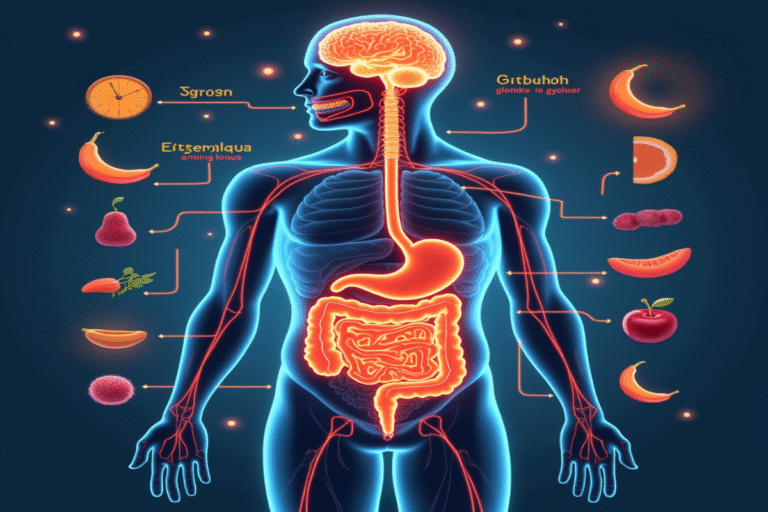Have you ever wondered why your stomach growls at the same time each day? Or why that feeling of fullness sometimes hits you mid-meal, seemingly out of nowhere? These everyday experiences are governed by a complex symphony of hormones flowing through your body, sending crucial messages between your digestive system and your brain.
The Hidden Conversation Between Your Gut and Brain
Inside your body, a sophisticated chemical conversation is taking place. Your stomach, intestines, fat cells, and brain are constantly communicating, using hormones as messengers to coordinate when you should feel hungry and when you’ve had enough. This communication network is far more intricate than the simple growling stomach many people associate with hunger.
This system evolved over millions of years to help our ancestors survive times of feast and famine. Today, it continues to function in a world where food is abundantly available, creating challenges for our ancient biology.
Ghrelin: Your Body’s “Feed Me” Signal
When your stomach is empty, cells in its lining secrete a hormone called ghrelin. Ghrelin is your body’s natural appetite stimulant – the only known hormone that actively increases hunger. Ghrelin levels typically spike just before mealtimes, which explains the predictable hunger you may feel if you eat meals at the same time each day.
Ghrelin doesn’t just make you hungry. Research has shown it also:
- Enhances memory and learning
- Improves sleep quality
- May protect heart cells and stimulate growth hormone release
When ghrelin reaches your brain, it activates neurons in the hypothalamus – your brain’s metabolic control center – triggering hunger sensations that are hard to ignore.
The Fullness Brigade: Leptin, CCK, PYY and More
After you’ve eaten, your body releases an impressive array of “fullness” hormones to signal that it’s time to put down your fork:
Leptin: The Long-Term Regulator
Produced mainly by fat cells, leptin acts as your body’s internal calorie gauge. Unlike ghrelin, which rises and falls throughout the day, leptin levels reflect your overall body fat. More body fat means higher leptin, which should signal your brain that you have enough energy stored and don’t need to eat as much.
The discovery of leptin in 1994 was once thought to be the key to curing obesity. Scientists believed that giving people more leptin would reduce appetite. But they found that many people with obesity already have high leptin levels but have developed “leptin resistance” – meaning their brains no longer properly respond to leptin’s signals.
The Rapid Responders: CCK, PYY, and GLP-1
While leptin is a long-term regulator, other hormones respond rapidly to what you eat:
- Cholecystokinin (CCK): Released by the small intestine within 15 minutes of eating, CCK responds to fat and protein. It signals fullness and triggers the release of digestive enzymes and bile.
- Peptide YY (PYY): This hormone rises 15–30 minutes after eating and stays elevated for hours, creating a lasting sense of satisfaction. PYY responds most strongly to protein-rich meals.
- GLP-1 (Glucagon-like peptide-1): Beyond signaling fullness, GLP-1 slows stomach emptying and helps control blood sugar by stimulating insulin release. Several diabetes and weight loss drugs are modeled after this hormone.
When Your Appetite Control System Malfunctions
Our appetite control system didn’t evolve for the abundance of today’s food environment. Several factors can disrupt this finely tuned system:
The Sleep Connection
Even one night of poor sleep can increase ghrelin levels by up to 15% and decrease leptin, creating a hormonal environment that makes you hungrier. This helps explain why chronic sleep deprivation often leads to weight gain – your hunger hormones are being recalibrated to make you eat more.
Emotional Overrides
Your appetite hormones can be overridden by your brain’s reward system. Pleasurable, high-calorie foods trigger dopamine release, motivating eating even when you’re not physically hungry. This “hedonic hunger” – eating for pleasure rather than need – explains why you might reach for dessert after a large meal.
Leptin Resistance: When Your Brain Ignores “Full” Signals
Chronic overeating can lead to leptin resistance. Your fat cells produce more leptin, but your brain responds less, similar to insulin resistance in type 2 diabetes. Your brain believes you’re starving, even when you have plenty of energy stored, creating a cycle of persistent hunger and overeating.
Surprising Facts About Your Appetite Hormones
Research on appetite hormones has revealed some surprising facts:
- Your gut produces over 20 different hormones involved in appetite regulation, making it essentially a “second brain” for metabolism.
- Exercise temporarily suppresses ghrelin, which may explain why intense activity can briefly reduce hunger.
- Artificial sweeteners can confuse your appetite hormones by stimulating sweet taste receptors without delivering expected calories.
- Your appetite hormones follow circadian rhythms – ghrelin often peaks at night, which may make late-night snacking more tempting.
- Stress hormones like cortisol can interact with and override normal appetite signals, driving stress-related eating.
Working With Your Appetite Hormones
Understanding this complex system can help you manage hunger more effectively:
- Protein power: Meals high in protein stimulate PYY and GLP-1 more than carbohydrates, keeping you fuller longer.
- Fiber effects: Fiber slows digestion and prolongs satiety hormones, helping maintain fullness.
- Consistent timing: Regular meal patterns help stabilize ghrelin production and prevent unexpected hunger spikes.
- Adequate sleep: Getting enough sleep keeps your ghrelin and leptin in balance.
Most importantly, hunger and fullness are not simply matters of willpower. They’re regulated by powerful biological systems refined over millions of years. When you feel hungry soon after eating or find it hard to feel full, it’s often not about discipline but about your hormones adapting – or struggling to adapt – to today’s world.
So next time your stomach growls or you push away your plate feeling satisfied, take a moment to appreciate the remarkable chemical orchestra behind those feelings – a system so intricate that even today, science is still uncovering its secrets.





